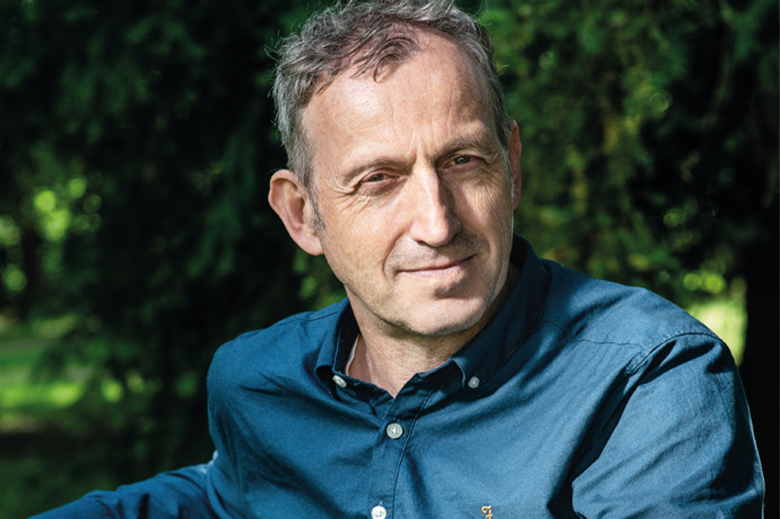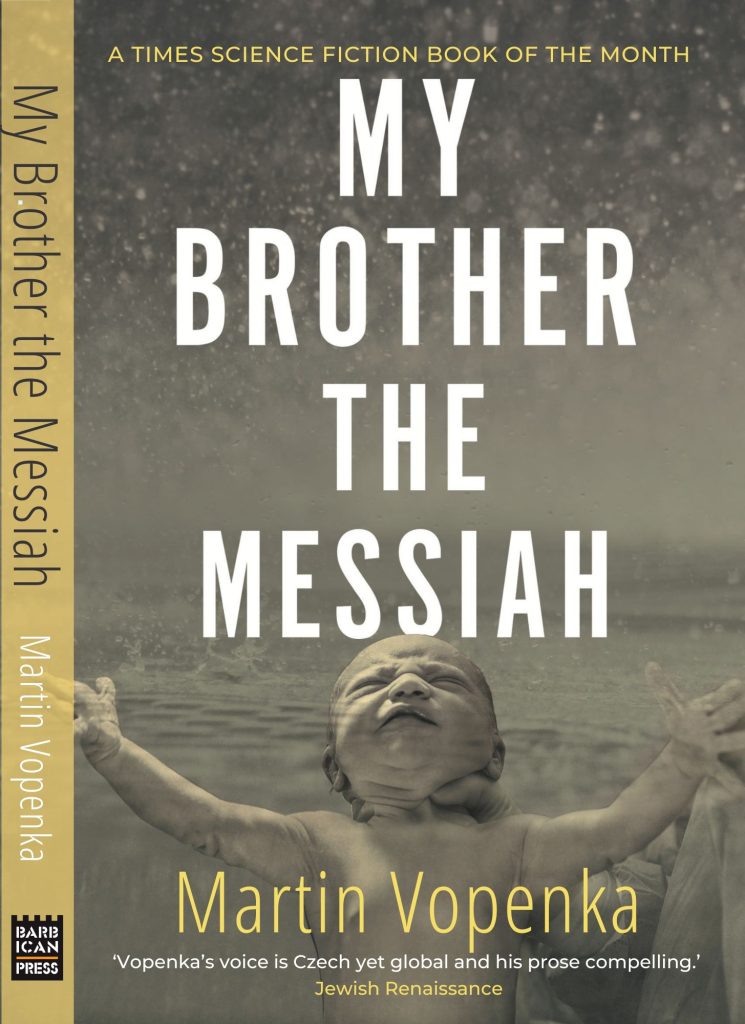





Martin Vopěnka (born 1963)
He’s been writing since his childhood, despite being forced to study mathematics and physics during the communist era. Yet this unwanted education was later used in some of his novels.
His work received awards and recently, a feature film was made based on one of his novels. His books were published in English, German, Italian, Polish, Russian, Bulgarian, Rumanian, Slovakian, French, Arabic, and Macedonian.
Vopěnka’s literature is distinguished by high sensitivity for the inner tension of an individual as well as for dangerous aspects of a whole society. Also for endangering our planet and our society.
His books for children and youth are among the most successful, popular, and appreciated in the Czech Republic. In them, too, he touches on serious topics in the belief that children are our good future and can do more than we think.
Occasionally, Vopěnka also devotes himself to poetry, which he considers to be the highest verbal formation. Some of his poems have been published in English in online anthologies.
Despite his steadily writing, he makes his living as a publisher. He established his publishing house Prah (in Czech: Threshold) in 1990 – shortly after the Velvet Revolution. He engages also socially. Since 2003, he is a chair of the Association of Czech Booksellers and Publishers and during his time he considerably enhanced the prestige of this organization. Regularly, he writes polemic articles for the newspapers.
“Vopěnka’s reputation as the next Milan Kundera is well cemented…” — Simon Ings, The Times.

My Brother the Messiah
If in the near future a new Messiah were to appear in the middle of Europe, would people accept him? And would it prove possible to establish a new religion?
It is 2096, and a state of drought has obtained for many years. The bed of the River Vltava has dried up. But hope exists thanks to a scientific project that fends off the sun’s rays in the stratosphere. Eli is born in the Prague district of Holešovice as the first rain is falling.
It is 2168, and Marek, Eli’s elder brother, is in a Greek settlement close to Mount Olympus, preaching to survivors of the worst exodus in human history. At this point, only a staunch handful believe that martyred Eli was the Messiah.
The latest novel by Czech writer and visionary Martin Vopěnka has the highest ambitions. Plausibly and with great sensitivity for the psychology of his characters, the author shows how much pain, love, hate, doubt and hope one life can bring, when its subject appears capable of emulating the role in human history played by Jesus. In the opinion of the author, although Jesus was not a miracle worker, the mere fact that his legacy has survived to the present day is a miracle in itself.
The novel is set in two time frames, the main one being in the year 2168. The scene is northern Greece, not far from Mount Olympus, where Marek, brother of Eli, the long-dead, presumptive Messiah, delivers a sermon to a modest gathering of Eli’s disciples. These followers are predominantly Czech: Eli, too, was a Czech.
This time, the sermon is attended by a slim, attractive girl. She gazes up at the ageing Marek (he is now over seventy) from the front row; after the sermon, she follows him to his bungalow. Marek is used to the attention of women, who usually come to him out of platonic love for Eli. But this girl, Natalia, takes him by surprise: her interest is in Marek himself, specifically the story of his life at Eli’s side.
Marek begins to talk – and so returns to the Prague district of Holešovice, on the banks of the River Vltava, where he was born in 2096. Eli was born in the same place in 2105. It is a time of climate catastrophe. Central Europe has been afflicted by drought for many years. The Vltava has practically dried up, and Prague is deluged by refugees from the south. The country is ruled by a president who was democratically elected but is now an out-and-out dictator; as the president succeeds in maintaining order, he has the support of the majority. Marek’s father is in the president’s employ.
Just before Eli’s birth, a significant breakthrough is achieved: world powers agree to place in the stratosphere a diffraction grating that should divert many of the sun’s rays, so cooling the atmosphere. This project raises huge levels of expectation. Before long, clouds really do appear. As the first rain falls, Eli is born at a nearby clinic.
Marek’s father, now a high-ranking officer in the dictator’s personal guard, chooses this very moment to leave the family, having found himself a new one. Marek’s sick, obese mother is left to bring up her two sons alone. Around Eli, things seem somehow to happen of their own accord. The family is apparently safe. Marek loves Eli from the first and feels a deep connection with him. He will live for him and him only until – aged over seventy – he meets Natalia. Though she is young and beautiful, Natalia loves Marek – for himself, not as the brother of the Messiah. This is a new situation for Marek, and he is confused by it. Eli’s disciples are unhappy that their prophet is living with the young newcomer, and they are concerned that he is neglecting his mission.
The book continues to switch between the storyline developing the psychology of Marek and Natalia’s love with a retrospective of the life of the Messiah.
The experiment with the grating has gone awry; a new ice age is sweeping into Europe from the north. The flow of refugees from south to north has been reversed. As states crumble, the exodus is marked by a struggle for survival, localized wars and killings. Although Eli performs no miracles, his words have a strange strength, attraction and power. The novel’s retrospective narration turns out to be a new gospel – a witness to the chosenness of the Messiah, albeit one that is difficult to understand. Aged thirty, Eli dies a martyr in Dubrovnik, Croatia, having fallen victim to wealthy Czechs whom he tried to convince of the need for modesty and humility, although he knew how his entreaties would end. For the seventy-year-old Marek, the memory of Eli’s death is still painful. The only true miracle foretold by Eli before his death is that those who fail to follow him will bear many fewer children or none at all. According to Eli, the miracle of creation should not be taken for granted.
It transpires that Natalia and Eli have something in common: she was born in Dubrovnik only weeks after Eli’s death. She has fled from her wealthy parents.
This ageing, childless world is coming to an end. Is a new beginning on the horizon? A small number of Eli’s disciples have borne children; the hatred this inspires puts them at constant risk. Some senior rabbis fly from the state of Israel to speak with Marek. If they can prove that Eli was a Jew and so accept him as the Messiah, the Jews will again bear children, and again be the chosen people. The rabbis refer to the traditional Jewish belief in two Messiahs: the first unites the Jewish nation, so effectively seeing out the old world, while the second establishes a new unity. But a genetic test soon ascertains that Marek is not a Jew; in that case, nor was Eli. The despondent rabbis return to their homeland, all hope lost.
One day, Natalia goes missing. Marek fears the worst: some of Eli’s disciples have refused to accept her presence among them. They may have abducted her; they may have killed her. Natalia has left several seemingly deliberate clues behind, but Marek cannot make out their message. A st
udent travels out from the city to help; in the story, he has a spiritual kinship with Saul of Tarsus – it seems that he will be the one to take Eli’s teachings into the wider world.
As his life draws to its close, Marek wishes to make a pilgrimage to Eli’s grave, which overlooks Dubrovnik. If he has read the signs correctly, Natalia will be there. In all likelihood, her parents were behind her abduction.
The pilgrimage to Dubrovnik takes several months. On their way, Marek and the student pass abandoned camps, languishing settlements and half-empty palaces that were once homes of the mighty. The student writes down what Marek tells him about Eli – this will form the basis of his teachings. At last they are within sight of Eli’s grave, where there is now a small shrine. Marek walks the last few steps alone. As he approaches the door, he hears bitter weeping. On entering the shrine, he sees a young woman with a new-born baby; it is she – Natalia – who is weeping. Between sobs, she tells him: “He spoke to me. I met him.” Eli has appeared to her, to tell her that her son will be the true Messiah. “Whose child is he?” asks Marek in confusion. “Yours and mine, you silly thing!” Natalia answers.
The novel My Brother the Messiah does not present a likely scenario for the future. But neither did the birth of Jesus – Jesus was born on the periphery of the world of that time. And if we do not believe that he turned water into wine, walked on water, brought Lazarus back from the dead and was the last of the last to be crucified, leaving behind but a few hopeless disciples, how did it happen that his teachings have survived in such powerful form as to become Europe’s dominant religion? It is this very unlikelihood in apparently helpless beginnings that Vopěnka’s novel’s captures with such virtuosity, freshness and originality. In so doing, he poses many questions on the future of humanity, redemption and hope.
